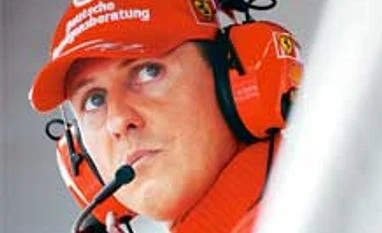Michael Schumacher, the greatest champion in the history of Formula One, was in a coma fighting for his life today after sustaining serious head injuries in a skiing accident in the French Alps.
Doctors have warned it is touch-and-go for the German racing legend as they wait for the full extent of his injuries to become clear after he fell and slammed his head on a rock while skiing off-piste on Sunday.
News of the accident stunned the Formula One community and racing stars joined German Chancellor Angela Merkel and legions of fans in expressing their hopes for his recovery.
"He is in critical condition, his condition can be described as life threatening," Jean-Francois Payen, head of the intensive care unit, told reporters.
Payen said he had been placed in an artificial coma to limit the impact of his head injuries on his brain.
Doctors said it was too early to say whether Schumacher, who is due to turn 45 on January 3, would pull through.
"It usually takes 48 hours, or even longer, to be able to formulate an opinion" on injuries of this severity, said neurologist Jean-Luc Truelle.
The coma reduces the patient's temperature to around 35 degrees Celsius (95 degrees Fahrenheit) to reduce swelling. By being unconscious, the brain is also switched off to sounds, light and other triggers that cause the organ to use up oxygen as it processes the stimuli.
Schumacher's condition was initially described as non-life-threatening after he was helicoptered off a mountain in the upmarket Meribel resort after the accident.
However it quickly deteriorated and he fell into a coma.
Stephan Chabardes, who operated on Schumacher, said the former racer arrived in hospital Sunday in an agitated state -- his arms and legs jerking uncontrollably -- and was not able to answer questions.
Payen said Schumacher had been operated on immediately and had suffered "serious and diffuse brain lesions". Doctors do not expect to perform a second operation.
He added that Schumacher would not be alive if he had not been wearing a helmet.
"Given the violence of the impact, his helmet partially protected him. If someone had had this type of accident without a helmet, they would definitely not be here," Payen said.
Doctors have warned it is touch-and-go for the German racing legend as they wait for the full extent of his injuries to become clear after he fell and slammed his head on a rock while skiing off-piste on Sunday.
News of the accident stunned the Formula One community and racing stars joined German Chancellor Angela Merkel and legions of fans in expressing their hopes for his recovery.
Also Read
Doctors at the hospital in the southeastern city of Grenoble where Schumacher is being treated said on Monday their famous patient was fighting for his life after suffering major brain trauma.
"He is in critical condition, his condition can be described as life threatening," Jean-Francois Payen, head of the intensive care unit, told reporters.
Payen said he had been placed in an artificial coma to limit the impact of his head injuries on his brain.
Doctors said it was too early to say whether Schumacher, who is due to turn 45 on January 3, would pull through.
"It usually takes 48 hours, or even longer, to be able to formulate an opinion" on injuries of this severity, said neurologist Jean-Luc Truelle.
The coma reduces the patient's temperature to around 35 degrees Celsius (95 degrees Fahrenheit) to reduce swelling. By being unconscious, the brain is also switched off to sounds, light and other triggers that cause the organ to use up oxygen as it processes the stimuli.
Schumacher's condition was initially described as non-life-threatening after he was helicoptered off a mountain in the upmarket Meribel resort after the accident.
However it quickly deteriorated and he fell into a coma.
Stephan Chabardes, who operated on Schumacher, said the former racer arrived in hospital Sunday in an agitated state -- his arms and legs jerking uncontrollably -- and was not able to answer questions.
Payen said Schumacher had been operated on immediately and had suffered "serious and diffuse brain lesions". Doctors do not expect to perform a second operation.
He added that Schumacher would not be alive if he had not been wearing a helmet.
"Given the violence of the impact, his helmet partially protected him. If someone had had this type of accident without a helmet, they would definitely not be here," Payen said.
)